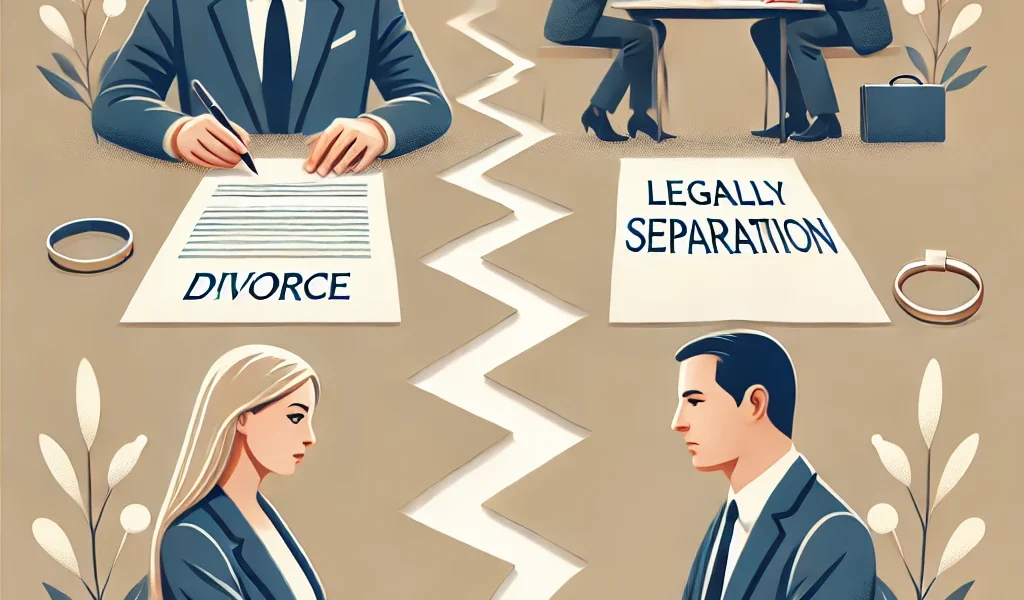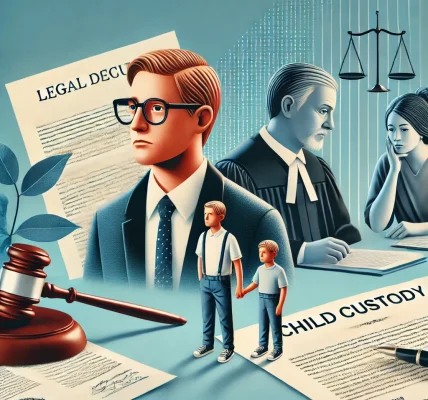When a marriage faces challenges, couples often find themselves choosing between divorce and legal separation. Both options can impact finances, emotional well-being, and future relationships, making it essential to understand the key differences. This article provides a clear, legally neutral, and SEO-friendly guide to help you navigate these decisions without getting entangled in legal complexities.
What Is Divorce?
Divorce is the legal termination of a marriage, dissolving all legal ties between spouses. Once finalized, both parties are free to remarry and have no further legal obligations to each other, except for court-mandated financial support (such as alimony or child support).
Key Aspects of Divorce:
- Legally ends the marriage.
- Requires division of assets and debts.
- Establishes alimony (if applicable).
- Determines child custody and support arrangements.
- Allows both parties to remarry in the future.
What Is Legal Separation?
Legal separation allows couples to live apart while remaining legally married. Courts may issue orders regarding property division, spousal support, and child custody, similar to a divorce, but the couple remains married under the law.
Key Aspects of Legal Separation:
- Couples live separately but remain legally married.
- Spousal support and child custody arrangements are enforceable.
- Assets and debts may be divided.
- Neither spouse can remarry unless they later divorce.
Key Differences Between Divorce and Legal Separation
| Aspect | Divorce | Legal Separation |
|---|---|---|
| Legal Status | Marriage is permanently ended. | Couple remains legally married. |
| Remarriage | Allowed after divorce is finalized. | Not allowed unless divorced later. |
| Financial Benefits | Loss of benefits like tax filing, health insurance, and spousal social security. | May retain financial benefits like health insurance and tax benefits. |
| Debt and Property Division | Divided permanently as per court order. | Division occurs but can be modified if divorce follows later. |
| Religious or Personal Beliefs | Suitable if religious or personal beliefs do not oppose divorce. | Preferred by couples who want to live separately without violating beliefs. |
| Reconciliation Possibility | Requires remarriage if the couple reconciles. | Easier to resume the relationship without remarriage. |
Pros and Cons of Divorce and Legal Separation
Advantages of Divorce:
✔ Legally ends all marital obligations.
✔ Provides a clear path to remarry.
✔ Ensures a final division of assets and debts.
Disadvantages of Divorce:
✘ Loss of spousal benefits (health insurance, tax advantages, etc.).
✘ Can be emotionally and financially draining.
✘ Potentially complex child custody battles.
Advantages of Legal Separation:
✔ Retains legal marital benefits (insurance, retirement, tax benefits).
✔ Easier to reconcile if the couple decides to reunite.
✔ Suitable for religious or personal beliefs that oppose divorce.
Disadvantages of Legal Separation:
✘ Does not allow remarriage.
✘ Financial responsibilities (debts, alimony) may still apply.
✘ Could lead to prolonged emotional and financial uncertainty.
Which Option Offers the Best Financial Returns?
The financial impact of divorce vs. legal separation depends on individual circumstances. Here’s a comparison:
1. Financial Stability
- Divorce: Finalizes financial separation, which can be beneficial for long-term planning.
- Legal Separation: Allows for continued access to shared financial benefits like insurance and pensions.
2. Tax Benefits
- Divorce: Filing as a single taxpayer may increase tax liability.
- Legal Separation: Couples can sometimes continue to file joint tax returns, leading to lower tax burdens.
3. Debt Responsibility
- Divorce: Ensures clear division of financial liabilities.
- Legal Separation: May still hold spouses accountable for shared debts.
4. Child Support and Alimony
- Both divorce and legal separation can include financial support arrangements. However, in legal separation, these can be more flexible and modifiable without going through another court process.
How to Decide Between Divorce and Legal Separation
Choosing between divorce and legal separation requires careful consideration of legal, financial, and emotional factors. Here are a few key questions to ask yourself:
- Do I want to remain legally married for financial or religious reasons?
- Am I open to reconciliation in the future?
- Do I need health insurance or other marital benefits?
- Am I prepared for the financial implications of full separation?
- Do I want the option to remarry in the future?
Steps to File for Divorce or Legal Separation
- Consult a Family Law Attorney – Understand your rights and obligations.
- File a Petition – Submit legal paperwork for divorce or separation in the family court.
- Serve the Other Spouse – Ensure your spouse receives the petition and has a chance to respond.
- Negotiate Terms – Work out asset division, custody, and support arrangements.
- Obtain a Court Order – A judge will issue a legally binding order finalizing the divorce or separation.
Final Thoughts
Both divorce and legal separation serve different purposes, and the right choice depends on individual circumstances. If you seek a permanent end to marriage, divorce may be the better option. If you need time, wish to retain financial benefits, or have religious objections to divorce, legal separation might be the right path.
This article is for informational purposes only and does not constitute legal advice. Consult a licensed attorney for personalized legal guidance.




